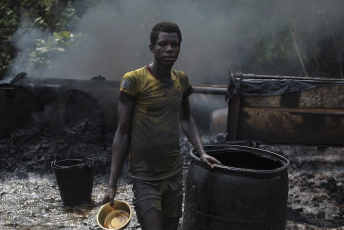In September 2018, the kidnapping of 14 young Cameroonian women in Kuwait City brought to light the trafficking of migrant workers in the Middle East. Following diplomatic negotiations between Kuwait and Cameroon, the young women returned home.
On the pretext of employment opportunities, and driven by poverty, unemployment and limited qualifications, young women pay intermediaries to be smuggled to the Middle East. Once there, they end up trafficked or enslaved.
According to Oumia Paba Salé, Near and Middle East Foreign Affairs Secretary at Cameroon’s Ministry of External Relations (MINREX), cases involve principally Kuwait, the United Arab Emirates and Saudi Arabia. Kuwait and Saudi Arabia are ranked among the countries with the highest prevalence of slavery in the Arab world in Walk Free Foundation’s Global Slavery Index in 2017.
The 2018 incident is neither unique nor unprecedented. In 2016, Cameroon’s government was already referring to a five-year old practice, implying that the phenomenon has existed since at least 2011.
One young Cameroonian woman who was held in Kuwait and returned to Cameroon in 2017, described to the media how the ‘Gulf route’ operates. According to reports, a police inspector in Yaoundé had convinced her that an employment network would take her to Kuwait for a monthly salary of US$1 000.
Once in Kuwait, she was hosted by an agency called ‘The Office’, which placed her with a so-called sponsor or employer. But she quickly realised that she had been sold like a commodity. She was lucky to be able to leave, but still had to repay The Office an amount of US$1 500 – assisted by her family – for her ‘release’. She said the family she worked for called her a ‘slave’ in Arabic.
In most cases, women travelling to Gulf countries are recruited through networks in Cameroon that advertise for candidates. In cities like Yaoundé and Douala, posters advertising such jobs are often seen at locations like universities, churches and other places frequented by vulnerable young women.
Persons familiar with trafficking networks told ENACT that victims typically pay between US$2 000 and US$3 000 to various actors in the chain, including police and airport immigration officials. A police officer that ENACT interviewed in October 2018 estimated that in the course of a year, local smugglers can make up to US$150 000 for sending around 50 women to the Gulf. Once a victim has been placed with a family, a local agency in the host country also receives an undisclosed amount of financial compensation.
This practice has serious implications at individual, family, community and state levels. It causes financial losses that are devastating for poor families; and their inhumane treatment leaves victims highly traumatised. Local traffickers often bribe police and immigration services to turn a blind eye on victims’ fraudulent travel documents.
In response to the 2018 revelations of the Kuwait trafficking route, returnees started raising awareness by sharing their experiences. Cooperation between Cameroon and Gulf countries has also been stepped up. According to Oumia Paba Salé, controls at airports, which are key in the trafficking routes, are becoming stricter. But more education and awareness-raising activities are needed, particularly at universities and other recruitment spots. Police in Cameroon and Gulf countries should take advantage of INTERPOL cooperation and capacity-building opportunities in fighting human trafficking.
Agnes Ebo’o, Coordinator, and René Oyono, Researcher, ENACT Regional Organised Crime Observatory – Central Africa, ISS







